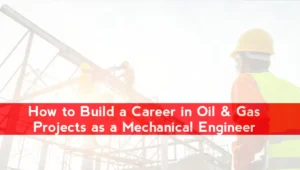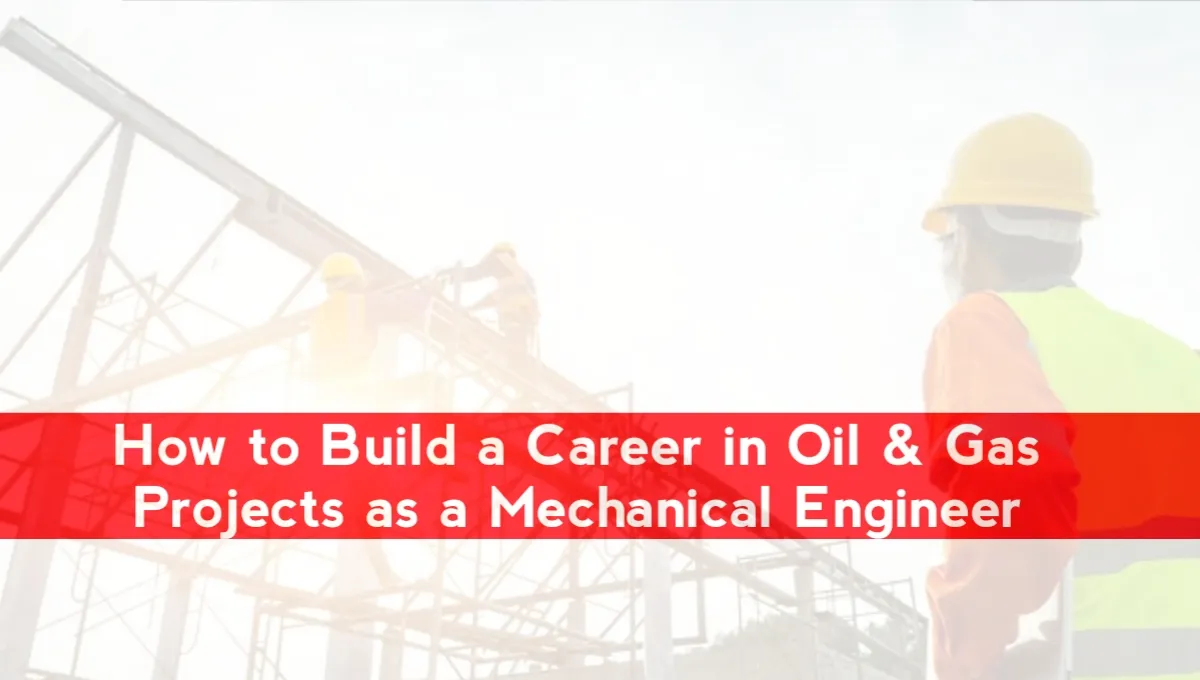How to Build a Career in Oil & Gas Projects as a Mechanical Engineer.
The oil & gas industry is one of the most powerful sectors driving global energy and infrastructure. For mechanical engineers, it offers high-paying jobs, international exposure, and career growth opportunities.
In India, major players like ONGC, IOCL, BPCL, HPCL, Reliance Industries, Adani, and L&T Hydrocarbon are expanding oil refineries, petrochemical plants, and offshore projects. Globally, Middle East countries (Saudi Arabia, UAE, Qatar, Kuwait) and Africa are investing billions in oil & gas infrastructure.
This blog explains how a mechanical engineer can build a successful career in oil & gas projects, the required skills, job roles, salary potential, and future outlook.
How to Build a Career in Oil & Gas Projects as a Mechanical Engineer
1. Why Oil & Gas Industry is Attractive for Mechanical Engineers
- High Salaries: One of the highest-paying engineering sectors.
- Global Opportunities: Jobs in Middle East, Africa, Europe, USA, and Asia-Pacific.
- Variety of Roles: From design and maintenance to safety and project management.
- Cutting-Edge Technology: Exposure to offshore rigs, pipelines, and petrochemical plants.
- Career Stability: Continuous demand for skilled engineers.
2. Job Roles for Mechanical Engineers in Oil & Gas Projects
a) Design & Engineering Roles
- Piping Design Engineer
- Mechanical Design Engineer (static & rotating equipment)
- CAD Draftsman for oil & gas layouts
b) Construction & Site Roles
- Mechanical Site Engineer (installations, welding, fabrication)
- QA/QC Engineer (quality control of equipment and pipelines)
- Planning Engineer (Primavera/MS Project scheduling)
c) Operations & Maintenance Roles
- Maintenance Engineer (pumps, turbines, compressors)
- Reliability Engineer (predictive maintenance systems)
- Shutdown/Turnaround Engineer (managing large-scale maintenance operations)
d) Specialized Roles
- HVAC Engineer in refineries
- Safety Engineer (OSHA/NEBOSH certified)
- Project Manager (handling EPC projects worth crores)
3. Required Skills for Mechanical Engineers in Oil & Gas
To succeed, mechanical engineers should learn:
- Piping Design Software: PDMS, SP3D, AutoPIPE, Caesar II
- Mechanical Design Tools: ANSYS, SolidWorks, AutoCAD
- Project Management Tools: Primavera P6, MS Project
- Industry Standards: ASME, API, ASTM codes
- Safety Knowledge: OSHA, NEBOSH, HSE regulations
- Welding & Fabrication Knowledge
4. Educational Path & Certifications
- Degree/Diploma: Mechanical Engineering (Diploma/B.Tech/M.Tech)
Certifications (Highly Recommended):
- Piping Engineering Course
- ASME Certification
- NEBOSH/OSHA Safety Certification
- API Certification (American Petroleum Institute)
- PMP (Project Management Professional)
5. Salary Scope for Mechanical Engineers in Oil & Gas
In India (2025):
- Freshers: ₹4–6 LPA
- Mid-level Engineers: ₹8–15 LPA
- Senior Engineers/Managers: ₹20–30 LPA
Abroad (Middle East, Africa, Europe):
- Freshers/Junior Engineers: ₹10–18 LPA
- Mid-level Engineers: ₹20–35 LPA
- Senior/Project Managers: ₹40–70 LPA
6. Indian Companies Hiring Mechanical Engineers in Oil & Gas
- ONGC (Oil and Natural Gas Corporation)
- IOCL, HPCL, BPCL (Oil Refineries)
- Reliance Industries Ltd (Jamnagar Refinery – world’s largest)
- Adani Petrochemicals
- L&T Hydrocarbon Engineering
- Engineers India Limited (EIL)
7. Global Opportunities for Mechanical Engineers
- Middle East: Saudi Aramco, ADNOC, Qatargas, Kuwait Oil Company
- USA & Canada: ExxonMobil, Chevron, Shell
- Europe: BP, TotalEnergies, Equinor
- Africa: Nigerian National Petroleum Corporation, Sonatrach
Impact: Indian engineers are highly preferred due to technical skills and cost-effectiveness.
8. Steps to Build a Career in Oil & Gas (Action Plan)
- Start with Entry-Level Roles: Apply as a site engineer, piping draftsman, or maintenance engineer.
- Get Certifications: Specialize in piping, safety, or project management.
- Gain On-Site Experience: 2–3 years in refineries, pipelines, or petrochemical plants.
- Apply Abroad: Use Gulf job portals, LinkedIn, and EPC contractor networks.
- Move into Senior Roles: After 8–10 years, aim for project manager or technical lead positions.
9. Future of Oil & Gas Careers (2025–2035)
- Continued Demand: Oil & gas will remain a global necessity despite renewable growth.
- Digital Integration: AI, IoT, and robotics will optimize plant operations.
- Green Transition: Engineers with hybrid skills (oil + renewable) will have an edge.
- High Abroad Demand: Middle East mega projects (like Saudi NEOM & Aramco expansion) will create lakhs of jobs.
Conclusion
The oil & gas industry remains a goldmine of opportunities for mechanical engineers. With India’s expanding refineries and global mega projects, the demand for skilled professionals is only growing.
Mechanical engineers should gain practical site experience, master design/software tools, and pursue global certifications to build a high-paying, long-term career in oil & gas.
For Indian engineers, this sector offers both domestic stability and international exposure — making it one of the best career choices in 2025 and beyond.
Follow Our Channel: Click here
Home Page: Click here

